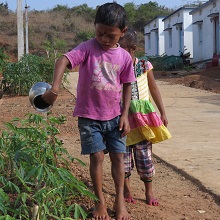Disasters are no longer rare, isolated shocks. They are an escalating development challenge.
In 2024 alone, global economic losses from disasters reached record levels, with the poorest countries hit hardest. Between 2019 and 2023, natural hazards caused economic losses of more than 5% of GDP in 12 countries —many of them highly vulnerable— with some cases exceeding 30-50%, according to the EM-DAT data. Beyond the immediate destruction, disasters carry profound socio-economic consequences: they disrupt economic growth and jobs, strain public finances, erode infrastructure, and push vulnerable households deeper into poverty.
For the World Bank, disaster risk management (DRM) is core development. It is directly linked to growth, fiscal stability, poverty reduction, and jobs. Disasters undo years of progress in moments, but investments in preparedness and resilience safeguard development gains, protect lives and livelihoods, and create the conditions for sustainable growth on a livable planet.
The World Bank supports countries in identifying, reducing, and managing disaster and climate risks. With the Bank’s cross-sectoral reach and financing at scale, DRM is integrated into investments in transport, energy, housing, health, education, and urban development. That means:
Roads that withstand floods and keep economies moving.
Schools that remain safe and operational during earthquakes and heatwaves.
Health facilities that continue providing essential care in times of crisis.
Cities that can manage storm surge and flood risks, enabling prosperity and attracting investment.
As the world’s leading source of official development assistance, knowledge, and support for DRM, the World Bank has a large portfolio that spans every region and sector. It is also Trustee of the Global Facility for Disaster Reduction and Recovery (GFDRR).
The World Bank’s support combines analytics, policy, and financing to help governments move from reactive crisis response to proactive, forward-looking resilience and preparedness planning.
Last Updated: Sep 24,2025


